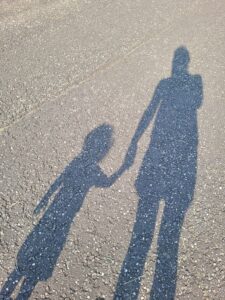One of the documentaries I recently discovered, which deeply touched me and helped me better understand the period of my life in a refugee camp in Serbia, is “Life Overtakes Me,” available on Netflix. The film depicts the lives of refugee children in Sweden who, while waiting for legal status due to uncertainty and insecurity, withdraw into a state resembling a coma that can last for years. Some of them wake up after several years, completely unaware of everything that happened around them.
From the age of ten, I lived in a refugee camp. As refugees from Croatia, we were accommodated in a refugee camp in Serbia, in barracks originally built in the 1980s for construction workers. My parents, brother, and I lived in two small rooms, sharing a bathroom with 40 other people. Life in the refugee camp was extremely difficult and isolated. We relied on humanitarian aid received once a month, facing unemployment, poor hygiene, and unavoidable conflicts among residents.
People of various backgrounds were settled in the camp, from bank directors and school principals to those coming from the most remote villages in Croatia. War and displacement brought together diverse people, forcing them to find a way to live together.
The local population, viewed us as outcasts, on the margins of society in a self-imposed ghetto. We lived in a ghetto where nobody from the outside wanted to step in.
The harsh conditions of the refugee camp left an indelible mark on me, especially during the tumultuous period of puberty. It was then that the first signs of the silent struggle emerged. Intense fear, accompanied by rapid breathing, leading to stiffness on the right side of my body and the eventual loss of consciousness characterized these seizures. Each episode became a haunting echo, leaving me in the dark about what transpired during those intervals. The attacks persisted, casting a long shadow that lingered until we eventually left the camp.
Desperate for answers, my parents sought the help of medical professionals. However, the cause of these seizures remained elusive, shrouded in mystery. Months would pass between attacks, and even during hospitalization after a severe episode, doctors failed to pinpoint a definitive cause. Suspicions of a brain tumor were laid to rest after extensive tests revealed no serious health issues. The origin of my seizures remained an enigma.
The seizures, became a source of shame, intensifying the fear of when the next one would strike. The most severe attack unfolded during my best friend’s 18th birthday celebration. The seizure wielded such force that it abruptly halted the entire celebration. Witnessed by all my friends, I collapsed, and my body convulsed on the dance floor. Subsequently, I slipped into unconsciousness, only to regain awareness in the sterile environment of a hospital room. Another significant attack, just days before entering college, disrupted my preparations for entrance exams. Although I managed to pass, the attacks thwarted my plans to enroll in my desired college, shattering significant milestones.
The seizures persisted into my twenties, an unwelcome companion until the moment my family and I moved out of the refugee camp. A new chapter began as we settled into a house my parents built, marking a departure from the shadows of the camp. Remarkably, the attacks ceased, and a semblance of normalcy returned, offering the promise of a seizure-free future.
The documentary “Life Overtakes Me” emerged as a turning point, offering newfound insights into my childhood and the struggles I endured. It dawned on me that I was not culpable for the harsh circumstances that enveloped my life. Those seizures were not a personal failing but desperate pleas to escape an environment that dehumanized us. Watching the documentary became a profound experience, liberating me from the weight of unconscious guilt.



